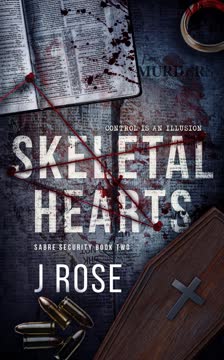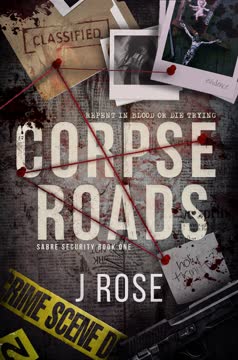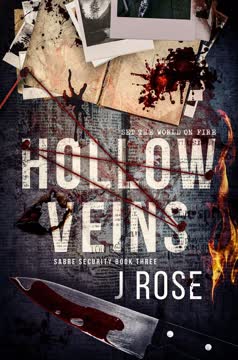Plot Summary
Blood and Blackberries
The story opens with a chilling prologue: young Leticia ("Letty") walks home alone through rain-soaked fields, humming "London Bridge is Falling Down." She meets a stranger, Michael, who lures her with kindness and religious talk, then kidnaps her. This trauma is the root of Harlow's fractured psyche and sets the tone for the novel's exploration of innocence lost, generational pain, and the predatory nature of evil. The abduction is not just a crime but the beginning of a cycle of violence, guilt, and survival that will haunt Harlow and those around her for years.
Fractured Family Ties
Years later, Harlow is a young woman, scarred by her past and living with the Sabre Security team. Her father lies dying in a hospital, her mother is distant and manipulative, and Harlow is caught between wanting to heal and being unable to trust. The Sabre team—Hunter, Enzo, Leighton, and Theo—are her found family, but even they struggle to reach her. The wounds of her childhood—abuse, neglect, and betrayal—are mirrored in her present relationships, and the search for truth about her parents' roles in her abduction becomes a central quest.
Sins in the Shadows
Sabre Security is investigating a string of ritualistic murders of women, all marked by religious symbolism and extreme violence. The killer, Pastor Michaels, is a ghost from Harlow's past, and his crimes are both personal and public. The team's investigation uncovers a web of cover-ups, corrupt institutions, and lost girls. Harlow's memories are fragmented, but she is the key witness and survivor. The case is complicated by public pressure, media scrutiny, and the killer's taunting messages, which force Harlow to confront her own guilt and complicity.
Haunted by Survival
Harlow's survival is a double-edged sword. She is plagued by nightmares, dissociation, and self-harm (trichotillomania). The ghosts of the other victims—Laura, Kiera, Candace—haunt her, and she feels responsible for their deaths. Therapy offers little relief, and her relationships with the Sabre men are strained by her inability to accept love or forgiveness. The team, each with their own scars, tries to protect her, but their overprotection becomes another form of imprisonment. The line between victim and survivor blurs as Harlow questions her own worth.
The Sinner's Mark
The killer's reach extends beyond the past. Sabre's car is vandalized with the word "SINNER," and Harlow is targeted by both the killer's supporters and the public, who blame her for the ongoing murders. The team's security measures tighten, but Harlow feels increasingly trapped. The investigation uncovers links to a corrupt children's home, Genesis, and the killer's accomplice, Mrs. Michaels (Rosetta Stone), whose own tragic history mirrors Harlow's. The past and present collide as the team races to prevent more deaths.
Unraveling the Past
Through interviews, forensic evidence, and Harlow's returning memories, the team uncovers the truth about Mrs. Michaels' identity and the killer's origins. Both were products of abuse and neglect, shaped by a system that failed them. Harlow's mother, Giana, is revealed to have played a role in her abduction, manipulated by her half-brother, Pastor Michaels. The revelation that the killer is Harlow's uncle adds a new layer of horror and betrayal. Harlow's sense of self is shattered, but she is determined to reclaim her story.
The Devil's Children
The killer's manipulation of Giana, and his own history of abuse at Genesis Home, reveal a cycle of trauma passed down through generations. Giana's religious mania and violence were fueled by her brother's influence, and her decision to give Harlow to him was both an act of desperation and complicity. The novel explores the idea that evil is not born but made, and that the true horror lies in the ways families can destroy each other. Harlow's confrontation with her mother is a reckoning with the past and a test of her own morality.
Love in the Ruins
Amidst the darkness, Harlow finds solace in her unconventional relationships with Hunter, Enzo, Leighton, and Theo. The novel is a reverse harem romance, and the men's love for Harlow is both a source of strength and conflict. Each man brings something different—Hunter's protectiveness, Enzo's passion, Leighton's humor, Theo's intellect—and together they form a new kind of family. Their willingness to share Harlow, and her eventual acceptance of their love, is a radical act of healing and defiance against the forces that tried to break her.
The Price of Protection
Sabre's efforts to protect Harlow often cross into control, echoing the dynamics of her captivity. Harlow resists being treated as a victim or a prize, and her struggle for autonomy becomes a central theme. The team's overprotection is well-intentioned but suffocating, and Harlow must assert her right to make her own choices—even if it means putting herself in danger. The tension between safety and freedom is never fully resolved, but Harlow's agency is ultimately affirmed.
Masks and Monsters
Harlow's trauma manifests in dissociation and memory loss, symbolized by her "masks". She is not the only one—each character wears a mask to hide their pain. The novel explores the ways people compartmentalize, perform, and survive. The killer, too, is a master of masks, hiding in plain sight and manipulating those around him. The process of unmasking—of facing the truth about oneself and others—is painful but necessary for healing.
The Breaking Point
As the investigation reaches its climax, the team is pushed to their limits. Hunter is gravely injured protecting Harlow, losing his hearing and sense of purpose. The team fractures under the strain, and Harlow's mental health deteriorates. The killer escalates his attacks, aided by a cult-like following. The public turns on Sabre and Harlow, blaming them for the violence. The sense of safety is shattered, and the characters are forced to confront their deepest fears and weaknesses.
The Truth Unleashed
Harlow's quest for answers leads her to confront her mother, uncovering the full extent of Giana's betrayal and Pastor Michaels' manipulation. The truth is devastating: Harlow was sacrificed by her own mother, and the killer is her uncle. The confrontation is violent and cathartic, ending with Giana's arrest and the exposure of the killer's network. Harlow's survival is no longer just about endurance but about reclaiming her narrative and demanding justice for herself and the other victims.
The Final Cage
In a harrowing climax, Harlow is recaptured by Pastor Michaels, who intends to complete his ritual and kill her. With the help of her father and the Sabre team, she fights back, refusing to be a victim. The battle is brutal, and not everyone survives unscathed. Harlow chooses to save another victim, Candace, over pursuing revenge, breaking the cycle of violence. Pastor Michaels escapes, but his power is broken, and Harlow's act of mercy is a turning point.
Sacrifice and Salvation
The aftermath is bittersweet. Harlow is physically and emotionally shattered, but she is surrounded by love and support. The team, too, is changed—Hunter must adapt to life as a deaf man, and the others reckon with their own traumas. Giana faces justice, and Harlow is finally able to forgive herself and her mother, recognizing that healing is a process, not a destination. The family chooses to leave England for a time, seeking peace and a chance to rebuild.
Aftermath and Ashes
The novel ends with the family preparing to leave for Costa Rica, determined to heal and find joy despite the scars they carry. Harlow's relationships with Hunter, Enzo, Leighton, and Theo are solidified—they are her boyfriends, her family, her salvation. The killer remains at large, but his power is diminished. The story closes on a note of hope: survival is not just about enduring pain but about choosing love, connection, and the possibility of happiness, even in a broken world.
Characters
Harlow (Leticia Kensington)
Harlow is the heart of the novel—a woman forged in trauma, defined by survival, and desperate for control over her own life. Abducted as a child by her uncle, Pastor Michaels, and betrayed by her mother, she is plagued by guilt, dissociation, and self-harm. Her journey is one of reclaiming agency, confronting the truth, and learning to accept love. Harlow's relationships with the Sabre men are both a source of healing and conflict, as she struggles to believe she is worthy of happiness. Her arc is about moving from victim to survivor to self-advocate, breaking the cycle of generational pain.
Hunter Rodriguez
Hunter is the stoic, authoritative head of Sabre Security and Harlow's primary protector. Driven by a fierce sense of responsibility, he is both a savior and a jailer, struggling to balance care with control. His injury and subsequent deafness force him to confront his own vulnerability and sense of worth. Hunter's love for Harlow is possessive but ultimately selfless, and his willingness to share her with the others is a hard-won act of growth. He embodies the tension between strength and fragility, leadership and loneliness.
Enzo Montpellier
Enzo is the team's muscle and Harlow's most ardent champion. Rough-edged and fiercely loyal, he is haunted by loss and determined not to lose Harlow. His desire for control is both protective and possessive, but he ultimately learns to share and trust. Enzo's relationship with Harlow is physical, intense, and healing for them both. He is the first to advocate for a polyamorous relationship, seeing it as a way to keep the family together. His arc is about learning to let go and accept love in all its forms.
Leighton Rodriguez
Leighton is Hunter's younger brother, recently released from prison and struggling to find his place. He uses humor and bravado to mask his insecurities and guilt over past mistakes. Leighton's relationship with Harlow is playful and supportive, but he also craves validation and fears being second best. His arc is about stepping up, taking responsibility, and accepting that he is worthy of love and family. Leighton's journey mirrors Harlow's in many ways, as both seek redemption and belonging.
Theo
Theo is the team's tech genius, socially awkward but deeply caring. He is haunted by the loss of a previous lover, Alyssa, and is slow to open up to Harlow. Theo's relationship with Harlow is built on trust, shared trauma, and intellectual connection. He is the most patient and gentle of the group, offering a safe space for Harlow to be herself. His arc is about moving past grief, embracing vulnerability, and finding joy in connection.
Pastor Michaels (Michael Abaddon)
The antagonist, Pastor Michaels, is a product of abuse and neglect, shaped by a corrupt system and religious fanaticism. He is both a victim and a perpetrator, using his charisma and intelligence to manipulate and destroy. His relationship with Harlow is twisted by familial ties and a desire for control. Michaels' crimes are both personal and symbolic, representing the ways trauma is passed down and perpetuated. He is a cautionary figure—a warning of what happens when pain is left to fester.
Giana Kensington
Giana is Harlow's mother, whose actions are the ultimate betrayal. Manipulated by her half-brother and driven by religious mania, she sacrifices Harlow in a misguided attempt at redemption. Giana is both a victim and a villain, her own history of abandonment and abuse shaping her choices. Her arc is one of reckoning and, ultimately, a plea for forgiveness. She represents the complexity of maternal love and the devastating consequences of untreated trauma.
Candace Bernard
Candace is the latest woman abducted by Pastor Michaels, her suffering paralleling Harlow's own. Her rescue is a turning point in the novel, representing the possibility of breaking the cycle and saving others. Candace's survival is a testament to the power of solidarity and the importance of not giving up, even in the face of overwhelming darkness.
Mrs. Michaels (Rosetta Stone)
Rosetta is the killer's long-time accomplice, herself a product of abuse and institutional neglect. Her tragic story mirrors Harlow's, and her death is both a warning and a catalyst for the final confrontation. Rosetta's complicity is complex—she is both a perpetrator and a victim, and her fate is a reminder of the dangers of unaddressed trauma.
Sabre Security Team (Brooklyn, Hudson, Kade, etc.)
The extended Sabre team provides a network of support, expertise, and occasional comic relief. Each member has their own scars and history, and their loyalty to Harlow and each other is a source of strength. They represent the possibility of chosen family and the importance of community in healing.
Plot Devices
Nonlinear Narrative and Fragmented Memory
The novel uses a nonlinear structure, with flashbacks, dreams, and dissociative episodes to mirror Harlow's fractured memory and sense of self. The reader is often as disoriented as Harlow, piecing together the truth from fragments. This device emphasizes the lasting impact of trauma and the difficulty of reclaiming one's story.
Reverse Harem Romance
The central romantic plot is a slow-burn, reverse harem (polyamorous) relationship, subverting traditional romance tropes. Harlow's refusal to choose between the men is both a personal and political act, challenging the idea that love must be exclusive or possessive. The relationships develop gradually, with each man representing a different aspect of healing and support.
Generational Trauma and Cycles of Abuse
The novel explores how trauma is passed down through families and institutions, shaping individuals and perpetuating cycles of violence. The killer, his accomplice, and Harlow's mother are all products of abuse, and their choices are both determined by and a reaction to their pasts. Breaking the cycle requires confronting the truth, making different choices, and seeking forgiveness.
Symbolism of Cages, Masks, and Rituals
Cages—literal and metaphorical—are a recurring motif, representing both captivity and the struggle for autonomy. Masks symbolize the ways characters hide their pain and perform for others. Rituals, both religious and personal, are used to control, punish, and (eventually) heal. The novel interrogates the line between faith and fanaticism, protection and control.
Foreshadowing and Parallelism
The novel is rich in foreshadowing, with early events and relationships echoing later developments. Harlow's childhood abduction is mirrored in Candace's ordeal; her mother's betrayal is paralleled by Rosetta's complicity. The final confrontation is both a literal and symbolic reckoning with the past, as Harlow must choose between revenge and mercy.
Analysis
Skeletal Hearts is a harrowing, unflinching exploration of trauma, survival, and the messy, nonlinear path to healing. J. Rose crafts a narrative that is as much about the legacy of generational pain as it is about the redemptive power of chosen family and radical love. The novel refuses easy answers: its characters are deeply flawed, their choices often destructive, and the line between victim and perpetrator is blurred by circumstance and history. Yet, amidst the darkness, there is hope—found in the willingness to confront the truth, to forgive oneself and others, and to accept love in all its complicated forms. The reverse harem structure is not just a romantic fantasy but a metaphor for the plurality of healing: no one person, no single act, can save us, but together, in community, we can begin to mend. Skeletal Hearts is ultimately a story about reclaiming agency, breaking cycles, and daring to believe that even the most broken hearts are worthy of love.
Last updated:
Review Summary
Skeletal Hearts is a dark, gripping reverse harem romance that continues Harlow's journey with the Sabre Security team. Readers praise the intense plot, character development, and emotional depth, though some find the relationships problematic. The book explores trauma, healing, and complex dynamics between Harlow and her protectors. Many readers appreciate the author's unflinching approach to difficult themes and the slow-burn romance. While some find it too long or frustrating, most are eagerly anticipating the series conclusion.
Sabre Security Series
Similar Books
Download PDF
Download EPUB
.epub digital book format is ideal for reading ebooks on phones, tablets, and e-readers.








